

Vladimir Putin: A 21st-century czar. It's just after 11 p.m., and Vladimir Putin is driving down a highway outside Moscow, hugging the inside lane as his advance and chase cars bomb along beside him, keeping the diverted traffic at bay.
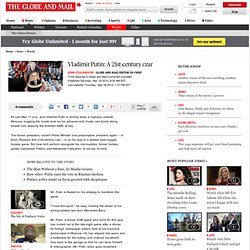
The former president, current Prime Minister and presumptive president again – in short, Russia's first 21st-century czar – is on his way to a weekly beer-league hockey game. But how he'll perform alongside his rink buddies, former hockey greats Viacheslav Fetisov and Alexander Yakushev, is not top of mind. Mr. Putin is fixated on his strategy to transform the game. “I love this sport,” he says, holding the wheel of his armour-plated, two-door Mercedes-Benz. Mr. “I want to help Russia be great again at this sport,” he says as we whiz by scenes from the new Russia.
Fields that a generation ago were tilled by peasants are now crowded with suburban mansions. Tonight, though, Mr. Tonight, he will start with hockey, next to the very place where the notorious tyrant, Joseph Stalin, died. That Mr. Mr. Putin's First Week Sees Wave of Challenges. Putin Rising, Russia Regressing - The Editors. The return of Vladimir Putin to the presidency of Russia is yet another unhappy milestone in that tragic nation’s post-Soviet history.
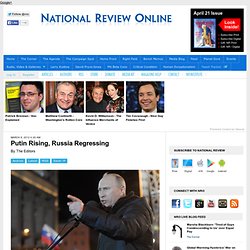
No country inspired more hope than Russia did when the Soviet Union fell 20 years ago in the wake of a peaceful revolution — and nowhere is it more evident that the Soviet Union today is being resurrected in a somewhat revised form. The election of Putin to his third term as president was hardly an exercise in democracy. Candidates capable of challenging Putin were not allowed to run, and the entire state bureaucracy was put to work on behalf of his candidacy. Nonetheless, it does indicate that many Russians still are ready to sacrifice freedom for what they mistakenly think is stability.
Putin Claims Victory In Russia's Presidential Election Amid Allegations Of Violations In Election. Russia - Sort of, but Not Really. Denis Sinyakov/Reuters Protesters in Moscow have gotten more brazen.
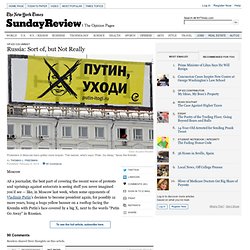
This banner, which says “Putin, Go Away,” faces the Kremlin. AS a journalist, the best part of covering the recent wave of protests and uprisings against autocrats is seeing stuff you never imagined you’d see — like, in Moscow last week, when some opponents of ’s decision to become president again, for possibly 12 more years, hung a huge yellow banner on a rooftop facing the Kremlin with Putin’s face covered by a big X, next to the words “Putin Go Away” in Russian. The sheer brazenness of such protests and the anger at Prime Minister Putin among the urban middle classes here for treating them like idiots by just announcing that he and President Dmitri Mevedev were going to switch jobs were unthinkable a year ago. But what will Putin do next? Leading article: A test for people power in Russia - Leading Articles - Opinion. They nervously recall the growing casualty list of regimes that miscalculated their response to demonstrations, most usually by allowing well-publicised brutality on the part of the state security forces.

The rally today in Moscow is a show of strength by the opposition in response to blatant ballot-rigging in the parliamentary elections last Sunday and the police violence that followed. A demonstration of up to 30,000 people is being allowed across the river from the Kremlin. The opposition would like to stage a rally which shows that popular anger against the government has reached an intensity not seen in Russia since the 1990s. Probably the ingredients that produced the Arab Spring and several "velvet revolutions" over the past decade are not yet present in Russia. The state has made mistakes, but is not so weak as to make it vulnerable to any home-grown Tahrir Square. Was Russia Behind Stuxnet? The U.S. and Israel are widely assumed to be responsible for the Stuxnet computer worm that hit Iran’s nuclear facilities.
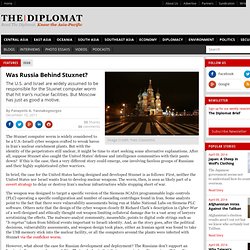
But Moscow has just as good a motive. By Panayotis A. Yannakogeorgos for The Diplomat December 10, 2011 Facebook0 Twitter1 Google+32 LinkedIn0 The Stuxnet computer worm is widely considered to be a U.S. In brief, the case for the United States having designed and developed Stuxnet is as follows: First, neither the United States nor Israel wants Iran to develop nuclear weapons. Bear nettles the eagle, dragon smiles. Bear nettles the eagle, dragon smiles By M K Bhadrakumar From an apparently impromptu remark on Monday, the United States has elevated the Russian parliamentary election held on December 5 to a core issue of US-Russia ties.
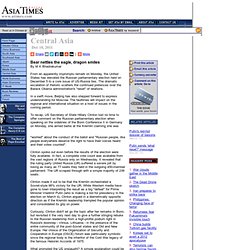
The dramatic escalation of rhetoric scatters the continued pretences over the Barack Obama administration's "reset" of relations. In a swift move, Beijing has also stepped forward to express understanding for Moscow. #OccupyMoscow - By Julia Ioffe. On Monday night, 24 hours after the polls closed in Russia's parliamentary elections and United Russia claimed victory with 49 percent of the vote, some 6,000 young Russians stood out in the cold rain in the park at Chistye Prudy voicing their dissatisfaction.

"Putin is a thief! " and "Russia without United Russia! " they shouted, teasing the once-and-future president by calling him Mr. Botox. When they started to march and the riot police attacked, they didn't budge. Leon Aron: What Russia’s Election Was Really About. As far as the actual voting was concerned, the only real question in Russia’s parliamentary election this week was the winning margin of the “party of power,” United Russia (or, as it is known by much of the public, partiya vorov i zhulikov, the party of thieves and swindlers).

Would it again receive around two-thirds of the votes or rather—despite ballot-stuffing, forced voting by state employees and students, manipulation of absentee ballots and, of course, the assistance of the Central Electoral Commission in tallying up the results—just miss the mark? (The answer: United Russia, although down, will end up with at least as many seats in the Duma as the other parties combined.)
But “elections” of this sort are never just been about the outcomes. They are also occasions for Russia’s leaders to descend into the public arena and “send signals,” as they used to say in Soviet days, about the country’s direction. Putin’s canny politics in Russian elections. Speculation is growing that Vladimir Putin will have to ease his grip on power if he wants to remain Russia’s leader.
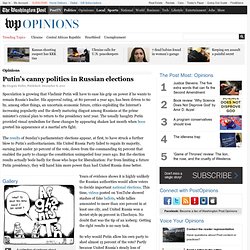
His approval rating, at 80 percent a year ago, has been driven to 60 by, among other things, an uncertain economic future, critics exploiting the Internet’s increasing popularity and the slowly maturing disgust among Russians at the prime minister’s cynical plan to return to the presidency next year. The usually haughty Putin provided visual symbolism for these changes by appearing shaken last month when boos greeted his appearance at a martial arts fight. The results of Sunday’s parliamentary elections appear, at first, to have struck a further blow to Putin’s authoritarianism. His United Russia Party failed to regain its majority, earning just under 50 percent of the vote, down from the commanding 65 percent that enabled the party to change the constitution unimpeded four years ago.
Gallery Video Vladimir Putin takes over from his stand-in. The Autumn of the US-Russia Reset. A colleague and I have described the post-Soviet era in Russia as the “age of impunity,” whereby even the most howlingly obvious crimes of man or state are implausibly denied or whitewashed in a manner redolent of Stalinist propaganda.
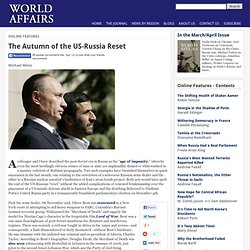
Two such examples have furnished themselves in quick succession in the last month, one relating to the conviction of a notorious Russian arms dealer and the other to a Russian nuclear scientist’s facilitation of Iran’s atom bomb project. Both acts would have spelt the end of the US-Russian “reset” without the added complications of renewed brinkmanship over the placement of a US missile defense shield in Eastern Europe and the drubbing delivered to Vladimir Putin’s United Russia party in a transparently fraudulent parliamentary election on December 4th.
First the arms dealer. Whither Russia? - Interview. Curse of the Krokodil: Fears as home-made Heroin that's rotting Russian addicts' flesh spreads across Europe. Dubbed 'the drug that eats junkies'Majority of addicts die within one year of first hit1.2million addicts in RussiaCases now reported in Germany By Lee Moran Updated: 15:57 GMT, 18 November 2011 A deadly drug which rots the flesh of users - and kills the majority of addicts within a year of their first hit - is spreading across Europe.
Krokodil originated in Russia but is now reportedly on sale in Germany - where several deaths have been blamed on its use - leading the Czech Republic's national drug agency to warn of its dangers. Dubbed 'the drug that eats junkies', it rots from the inside, causing such severe damage to tissue that users suffer from gangrenous sores which open all the way to the bone. Scroll down for graphic video on effects of Krokodil Krokodil: Dubbed 'the drug that eats junkies', it turns its users' skin scaly, eating them from the inside.
Extraordinarily, around 1.2 million Russians are believed to have been ravaged by the narcotic, Time magazine has reported. Dark Hero. Condoleezza Rice Blames Putin for War with Georgia. The Atlantic magazine’s website reported what would have been a surprising bit of news. “Condoleezza Rice Blames Georgian Leader for War With Russia,” the headline for Joshua Kucera’s article reads. The sub-headline states: “The former secretary of state contradicts the view, held by many U.S. Republicans, that Russia began the 2008 war.” And the author writes, “Former U.S. Secretary of State Condoleezza Rice says Georgian President Saakashvili alienated potential NATO allies by 'letting the Russians provoke him' into starting a war over South Ossetia.” From Liberal to Lackey. When President Dmitry Medvedev assumed office four years ago, it didn’t take long for a deep split between Russia’s main liberals to develop. As a result, two new camps formed: liberal modernizers and a liberal opposition.
The first group was led by Igor Yurgens, Yevgeny Gontmakher and other analysts from the Kremlin-linked Institute of Contemporary Development. In their numerous articles, reports and interviews, they supported Medvedev, proclaiming that he was a liberal reformer. They called for a broad “modernization coalition” that would convince Medvedev that he had his own social base and would motivate him to shift from making vague hints and liberal speeches to taking decisive action.
Russian Hangover - Magazine. A Moscow apartment block’s tenants turn over, one vodka binge at a time. “Help me, sonny!” The old man said, holding out his hand as he lay on the landing outside the door of our Moscow apartment. I reached down to help him up. “No, rubles! Give me r-r-rubles!” He was stinking drunk, with a spent vodka bottle by his side, but he still wanted more alcohol. A couple of years passed this way. His death was the first of many during our time in our building, a five-story apartment block—sturdy, brown-brick, and Soviet-era—in central Moscow, near Belorussky Station, but placidly situated on a park. In our pod’yezd (entranceway), the mix of tenants reflected the Soviet collective ethos of decades past: a doctor, a university dean, manual laborers, a cleaning lady, a military family, and a lanky, auburn-haired teenager named Oleg who lived directly beneath us. Oleg was one of the first people I remember meeting in our pod’yezd.
Silence ensued, but only temporarily. “Please help me!